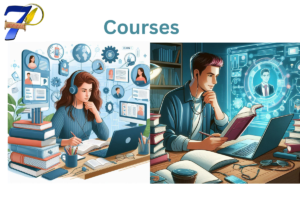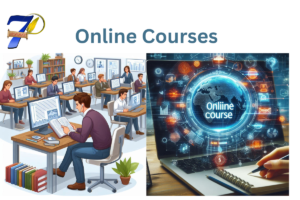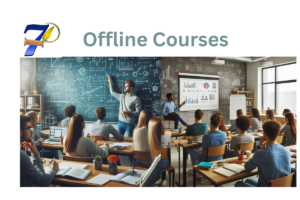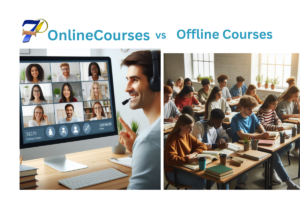Learning is one of the fundamental needs of every living organism. In this fast-growing world, learning become more important to learn new things and stay up to date. Generally, human learns most things from the environment, but some things, especially some skills, need to be learned through different courses. In this post, we will learn about courses, their types, the differences between their types, and much more.
Introduction:
The course refers to many different things according to the context, but in this blog, we will discuss education-related courses.
In General: The path, route, or direction followed by someone (i.e. ship, airplane) is referred to as a course.
In Education: A series of lessons or classes focused on learning a particular subject or skill is known as a course. An education course means a set of classes, lectures, or plans of study on a particular subject to pass an exam or get a degree or certificate and to improve skills.

Example:
In matriculation, if a student chooses computer as his/her main course then he/she has to follow the schedule/ syllabus assigned by the relevant education board. For instance in FBISE (FEDERAL BOARD OF INTERMEDIATE AND SECONDARY EDUCATION) the student who had to choose computer as the main course he/she had to follow the following syllabus before the examination in a given period:
Unit 1: Programming
Unit 2: Programming in C
Unit 3: Input / Output Handling
Unit 4: Control Structure
Unit 5: Loop Structure
Unit 6: Computer Logic and Gates
Unit 7: World Wide Web and HTML
He/she also has to study English, Physics, Chemistry, Urdu, Pak Studies, and Islamiat to get the certification of matriculation from FBISE.
Types:
The course can be divided into many different types but we are mainly focussing on the basic types. We can divide courses into two types:
- Online.
- Offline.
Online Course:
Online courses refer to courses that are taught completely or partially by using the Internet. The learner should have a mobile or laptop with internet connectivity and he/she can access the it from different websites or other platforms like YouTube. It is more easily accessible as compared to offline courses, if the learner has a good internet connection, then he/she can access the course anytime anywhere. The learner has the freedom to choose the course according to his/her needs and will.
The main advantages are time-saving, freedom to choose a course, cost-effectiveness, accessibility, flexibility, availability, and international certification offered by different websites e.g. Coursera and Udemy.
However, it has many disadvantages for instance it always requires good internet speed and fast devices (laptop, mobile, or computer), and it may result in internet or technology addiction, less social life, and less interaction with other learners.

For more information click here.
Examples:
Some most common types of online courses are:
Language (i.e. English, Spanish, Urdu, Arabic, and Chinese, etc.)
Computer programming languages (i.e. C, C++, Java, JavaScript, Python, C#, etc.).
Web development (i.e. HTML, CSS, JavaScript, React and WordPress, etc.)
Benefits:
There are many benefits of online courses, some are as follows:
- Time-saving
- Cost-effective
- Flexibility
- Availability
- Accessibility
- International Certification
- Self-made schedule
Offline Course:
Such courses in which the physical appearance of the learner/student is necessary are called offline courses. It refers to the education we seek in schools, colleges, and universities or academies. It does not require any internet connectivity. The learner/student can go to the course center and enroll him/herself in the courses offered by the academy. A student is restricted by a schedule and he/she cannot access the course all the time.
The main advantages are self-grooming, social gathering, interaction with other learners/students, boost in self-confidence, good communication skills, and a certificate after completing the course.
It also has many disadvantages like wastage of a lot of time, cost as compared to online courses, less accessible and available, limited flexibility, etc.

For more information click here!
Examples:
Some of the most common examples of offline courses are:
- Education sectors( Schools,Colleges and Universities)
- Academics: A learner can learn different types of skills from non-education sectors like academies.
Benefits:
There are several benefits of offline courses, few benefits are given below:
- Self Grooming
- Physical appearance
- Interaction between other learners
- Certification
Difference between Online and offline courses:
| Online Courses | Offline Courses |
| No physical appearance | Physical appearance |
| Less time consuming | More time consuming |
| Flexible schedule | Fixed schedule |
| Cost-effective | Costly |
| Available all time | Not available all the time |

Some Most Popular Online Courses People used to prefer:
- Programming languages: e.g. C++, Java, Python, C, C#, Javascript, etc.
- Web Development: e.g. HTML( Hyper Text Markup Language), CSS(), JavaScript, WordPress, React, etc.
- Language: For example English, Chinese, Japanese, Hindi, Urdu, Arabic, and German etc.
- Graphic Designing and Video Editing.
- SEO( Search Engine Optimization).
- Video Editing.
- Graphic Designing.
- AI( Artificial Intelligence)
- Digital Marketing.
- Cybersecurity.
Some Top Online Platforms to Do Courses:
- Coursera
- Udemy
- LinkedIn Learning
- Digiskills
- Great Learning Academy
- edX
- Khan Academy
- Skillshare
- FutureLearn
- Pluralsight
- Teachable
- MasterClass
- W3 Schools
- NEVTEC
Read more.
Why Programming Matters: The Crucial Role of Programming in Today’s World.
Education: Beyond Facts|A Guide to Critical Thinking and Creativity.
Good work keep it up .